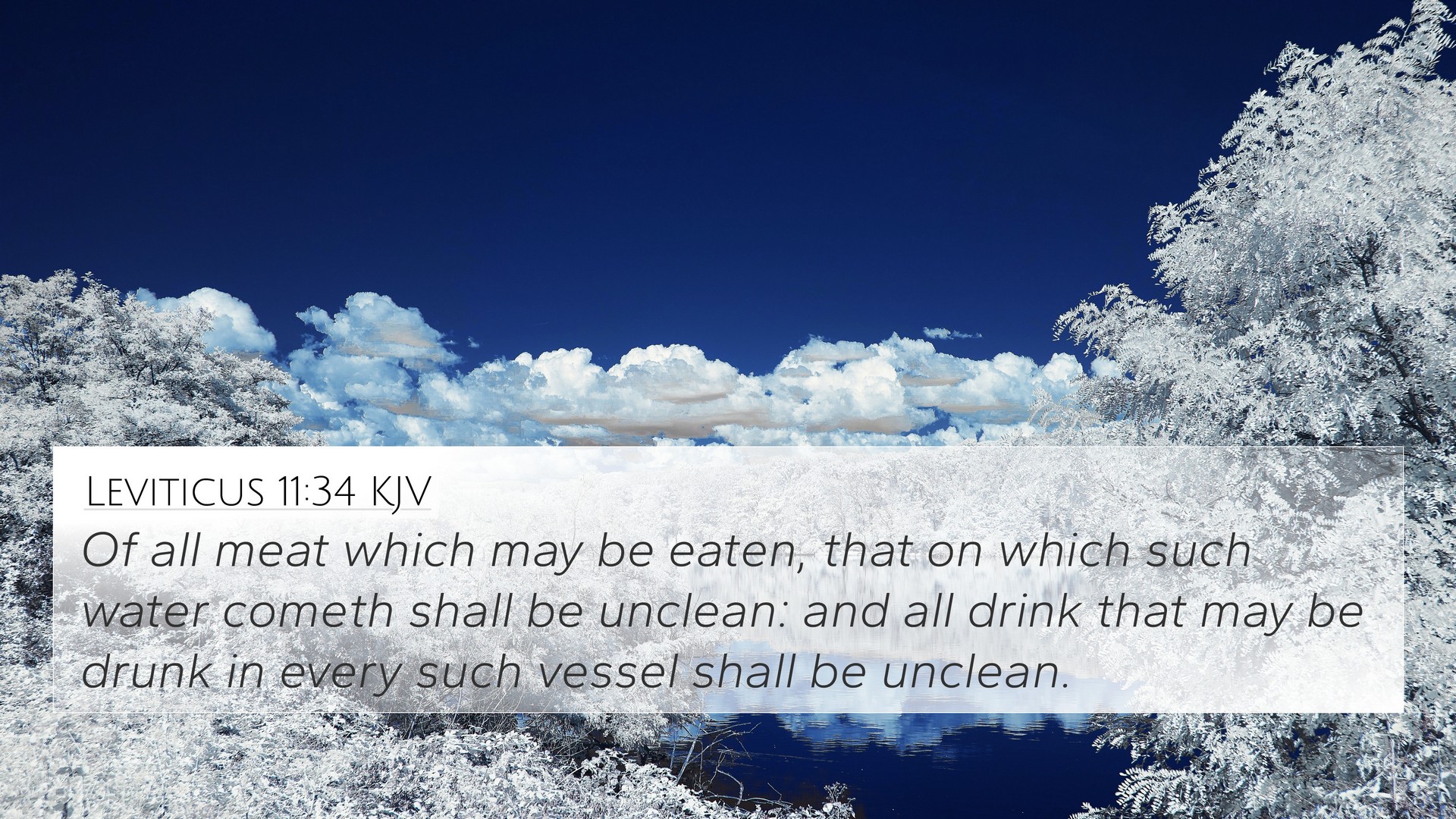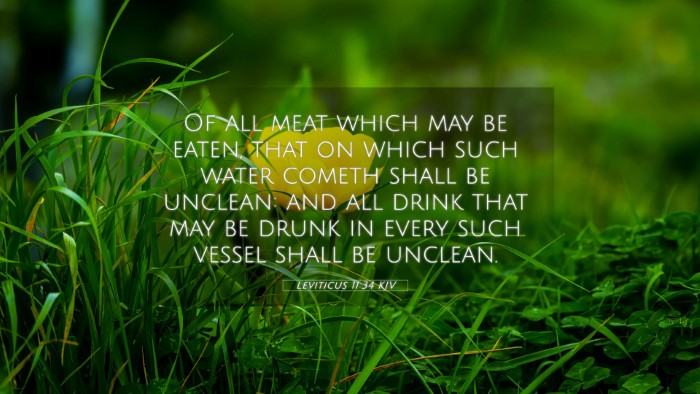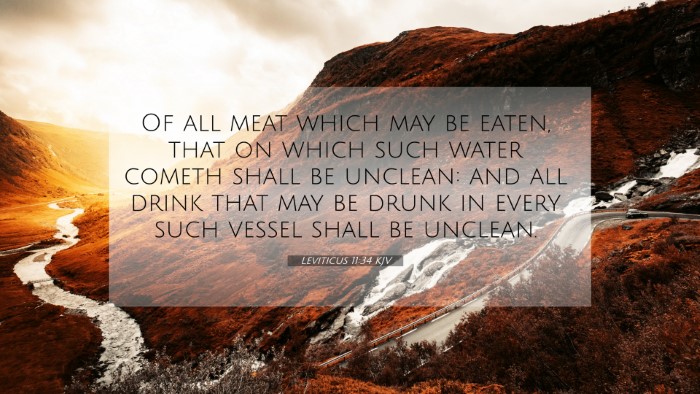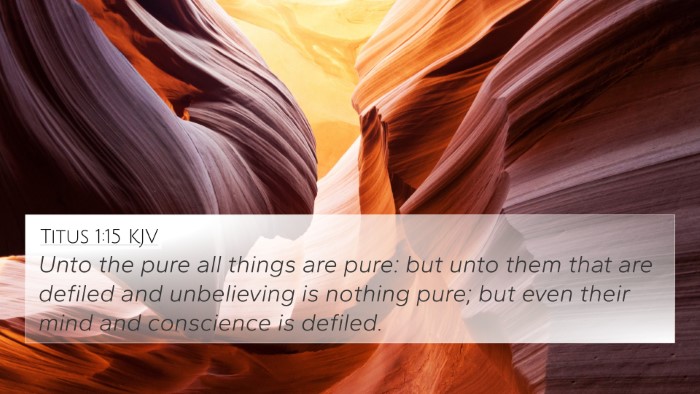Introduction to Leviticus 11:34
Leviticus 11:34 states, "Of all the food which may be eaten, that on which such water comes shall be unclean.” This verse is part of a larger section concerning dietary laws that were given to the Israelites. The significance of this verse lies in its emphasis on cleanliness and the distinction between clean and unclean foods, which serves a twofold purpose: spiritual and physical purity.
Commentary Insights
Matthew Henry's Commentary:
Henry emphasizes the spiritual implications of dietary restrictions, noting that the cleanliness laws symbolize holiness. The unclean status of food that comes into contact with impure water represents the overarching theme of separation from defilement. The verse is not merely about food; it reflects the broader character of Israel as a holy nation.
Albert Barnes' Notes:
Barnes explains the practical aspects of these dietary laws, elaborating on how purity laws governed the daily lives of the Israelites. He highlights that what is deemed unclean can affect not only the individual but also the community. The correlation between physical cleanliness and spiritual integrity is consistently important in the Levitical laws.
Adam Clarke's Commentary:
Clarke expands upon the concept of cleanliness and uncleanliness in this verse by discussing the symbolic meanings associated with water and food. He posits that the laws serve as a reminder of God's holiness and the need for His people to maintain a relationship free from moral or spiritual pollution.
Symbolism and Themes
The themes present in Leviticus 11:34—cleanliness, separateness, and holiness—form a foundation for understanding the broader Levitical codes. The necessity for ritual purity highlights God's call for His people to reflect His character in all aspects of life.
Cross-References
- Leviticus 11:1-3: Outlines the dietary laws specifically related to clean and unclean animals.
- Deuteronomy 14:3-21: Reiterates and expands upon dietary restrictions established in Leviticus.
- Isaiah 66:17: Speaks of those who eat unclean animals and their consequences, linking dietary practices to spiritual outcomes.
- Mark 7:18-19: Jesus challenges the understanding of clean and unclean, emphasizing inner purity over dietary laws.
- 1 Peter 1:15-16: Calls believers to be holy as God is holy, echoing themes found in Leviticus.
- Romans 14:14: Discusses dietary practices among Christians, indicating the evolving understanding of clean and unclean.
- Hebrews 9:9: Refers to the old system of laws that could not perfect the conscience, hinting at the limitations of physical purity laws.
Connections between Bible Verses
The connections between Leviticus 11:34 and other scriptures reveal a dialogue throughout the Bible regarding purity and holiness. The exploration of these themes reveals insights about God's nature and expectations for His people. Each cross-referenced verse contributes to a deeper understanding of how Old Testament laws relate to New Testament teachings, showcasing the continuity of God's message.
Applications for Biblical Study
This verse and its surrounding context offer rich material for comparative Bible verse analysis. By cross-referencing Leviticus 11:34 with related verses, one can evaluate how themes of cleanliness and holiness evolve from the Old Testament to the New Testament. Tools for Bible cross-referencing, such as a concordance or a cross-reference guide, can greatly enhance this study.
How to Use Bible Cross-References
Engaging with cross-references allows for a comprehensive understanding of Biblical texts. By identifying connections between verses, believers can draw significant insights that may apply to their lives. For example, applying the purity concepts in Leviticus can invite reflections on modern practices of holiness and moral integrity within the Christian faith.
Conclusion
In conclusion, Leviticus 11:34 serves as a pivotal verse in understanding God's call for His people to maintain spiritual and physical cleanliness. By utilizing various commentaries and cross-referencing with related verses, one can uncover a wealth of interpretations that resonate through both the Old and New Testaments. This interconnectedness enhances our understanding of God's will and the overarching narrative of Scripture.







